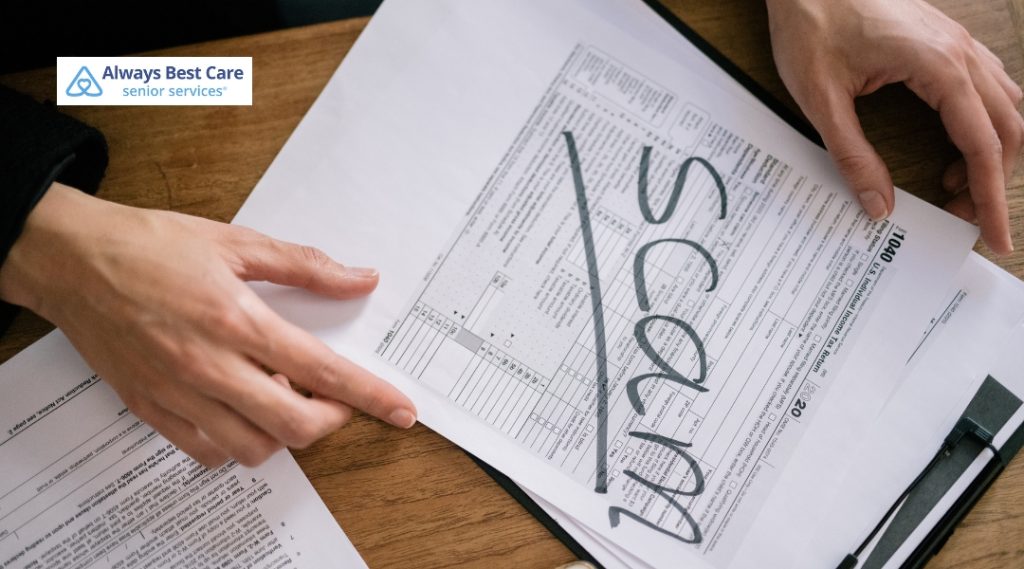Stay Safe: How Seniors Can Spot and Avoid Scams in NW Chicago, IL

As we age, our wisdom and life experience become invaluable—but unfortunately, so does our vulnerability to scams. In the vibrant neighborhoods of Northwest Chicago, seniors are often targeted by increasingly sophisticated fraudsters who prey on trust, kindness, and routine.
Our guide helps seniors—and those who care about them—recognize the warning signs of common scams, take practical steps to stay safe, and feel confident navigating daily life with peace of mind because everyone deserves to feel safe and secure in their own community.
Table of Contents
6 Scams Targeting Seniors in NW Chicago
Phone Scams: Posing as Family or Officials
One of the most common scams involves someone calling and pretending to be a grandchild or another relative in trouble—claiming they’ve been in an accident, arrested, or need money quickly. Another variation involves someone posing as an IRS agent, police officer, or Social Security official, demanding payment or threatening legal action. Always verify. Hang up and call the family member or agency directly using a number you trust—not the one the caller gives you.

Medicare and Health Insurance Fraud
Scammers may call or show up offering “free” medical equipment or services in exchange for your Medicare number. Others pose as Medicare representatives to collect personal details, which are then used to bill Medicare fraudulently—or worse, steal your identity. Never give out your Medicare number or health information to anyone who contacts you unexpectedly.
Tech Support Scams: Fake Virus Alerts
A pop-up on your computer says you have a virus, or someone calls claiming to be from Microsoft or another tech company. They ask for remote access or payment to “fix” the problem—which often doesn’t exist. Real tech companies don’t make unsolicited calls. If in doubt, shut down your device and consult a trusted local tech support provider.
Sweepstakes and Lottery Scams With Upfront Fees
“You’ve won a prize!” the letter or call announces—but there’s a catch. You’re told to send money to cover “processing fees” or taxes before you can claim your winnings. Sadly, there is no prize, and your money is gone. If you didn’t enter a contest, you didn’t win. Never pay to claim a prize.
Romance Scams Targeting Isolated Seniors
Online dating and social platforms have opened new doors for social connection—but also for fraud. Scammers build fake relationships over weeks or months, then begin asking for money for emergencies, travel, or medical needs. Be cautious with anyone who avoids meeting in person and asks for money—no matter how convincing their story may be.
Charity Scams Around Holidays and Disasters
Scammers take advantage of your generosity during the holidays or after disasters. They create fake charities or impersonate real ones to ask for donations by phone, email, or even door-to-door. Always verify a charity before donating. Use websites like Charity Navigator or the Better Business Bureau’s Wise Giving Alliance to check their legitimacy.

4 Scam Warning Signs Every NW Chicago Senior Should Know
Urgent Demands That Create Panic
Scammers rely on pressure and fear to get you to act quickly—before you can think clearly. They may say you’ll be arrested, lose your benefits, or that a loved one is in danger if you don’t act right now. Anytime someone demands immediate action or says, “Don’t tell anyone,” stop and step back. Legitimate agencies don’t operate this way.
Requests for Payment via Gift Cards or Crypto
A classic scam move asks for payment in unusual ways—like gift cards, wire transfers, or cryptocurrency. They may say it’s the “only way” to pay a fee, fine, or bill. No real business or government agency will ever ask you to pay with gift cards or crypto. If someone does, it’s a scam.
Messages With Errors or Suspicious Links
Whether it’s a fake email, text, or social media message, scams often include spelling mistakes, awkward language, or strange links. Clicking on these links could lead to malware or phishing attempts. If a message seems odd, don’t click anything. When in doubt, delete it or ask a trusted family member to take a look.
Claims From Supposed Authorities Like the IRS or Medicare
Scammers love impersonating official agencies, using fake credentials and threats to get information or money. They may say they’re from the IRS, Medicare, Social Security, or law enforcement, insisting you owe money or need to update your details. These agencies will never call you unexpectedly to demand money or personal information. Hang up and call the agency directly using an official number.

How In-Home Care Helps Prevent Scams
In-home care offers more than just help with daily activities—it also adds a layer of security. A trusted caregiver can help seniors spot suspicious behavior, avoid risky situations, and feel confident in their day-to-day decisions.
Caregivers are trained to notice red flags—like sudden phone calls from strangers, unusual mail, or behavioral changes that might suggest a senior is being targeted. They can step in, ask questions, and notify family members when something seems off.
Many scams succeed because seniors feel alone or want someone to talk to. A friendly, familiar presence like an in-home caregiver can reduce loneliness and offer daily opportunities for conversation—helping prevent scam attempts from taking root.
Seniors don’t have to navigate scam risks alone. Local senior centers, police departments, libraries, and nonprofit organizations often host fraud-awareness events, offer helpful guides, and provide reporting assistance.
At Always Best Care of Northwest Chicago, we’re more than caregivers—we’re partners in safety. Our trained staff provides compassionate care and helps clients avoid scams through education, vigilance, and daily support. We stay informed so you can stay protected.
Always Best Care Caregivers Provide Added Protection!
At Always Best Care of Northwest Chicago, we are dedicated to ensuring the safety and well-being of seniors. Our compassionate caregivers provide daily assistance, companionship, and guidance to help protect against fraud.
Contact Always Best Care of Northwest Chicago at (312) 465-6833 to learn more and schedule your free consultation. Stay informed, stay alert, and stay safe.





